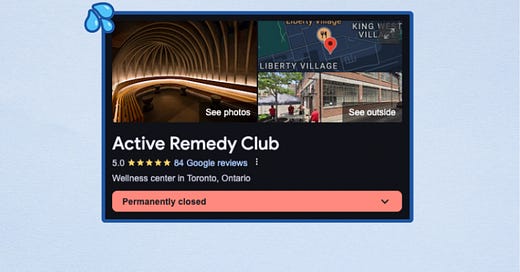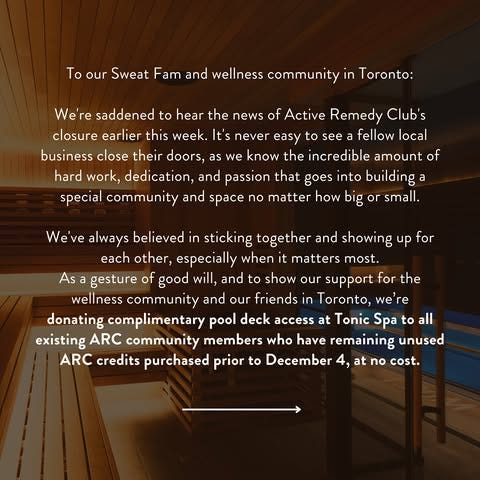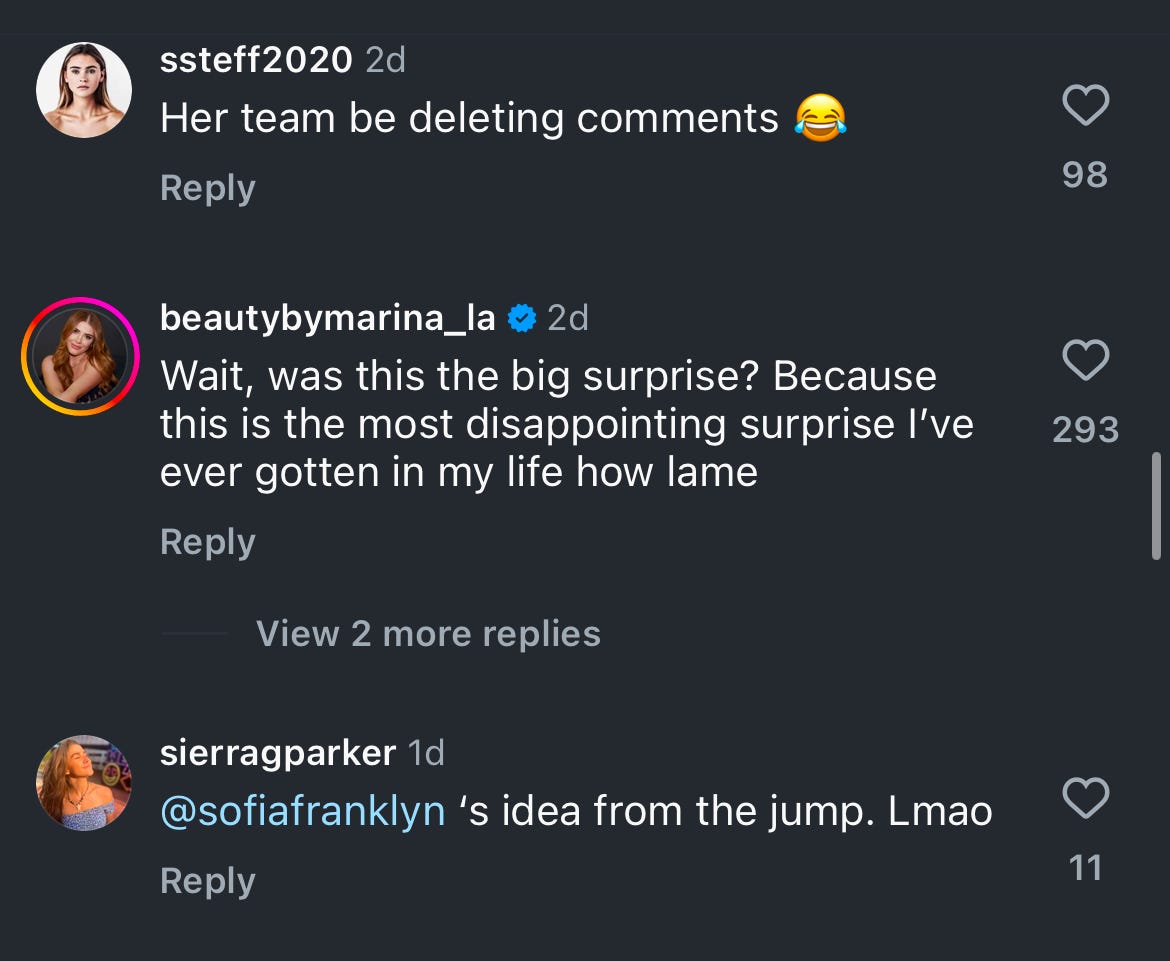Active Remedy Club is shutting down.
The space was beautiful and reviews were positive. What happened?
“It is with great regret that Active Remedy Club will be closing its doors.”
ARC took to Instagram on Tuesday to announce they would be shutting down their 4,000 sq. ft. recovery club just six months after opening. Most people I reached out to with knowledge of the business spoke highly of what Michael Gho and Ben Gilbert had built but emphasized they were burning money with no clear path to profitability.
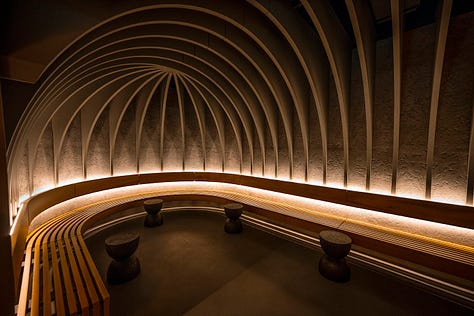
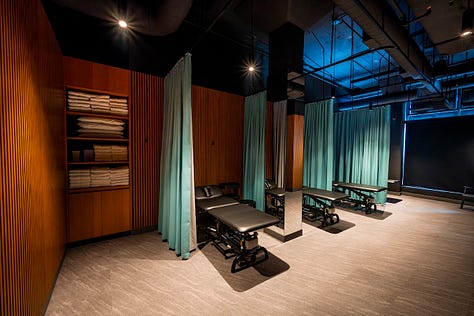
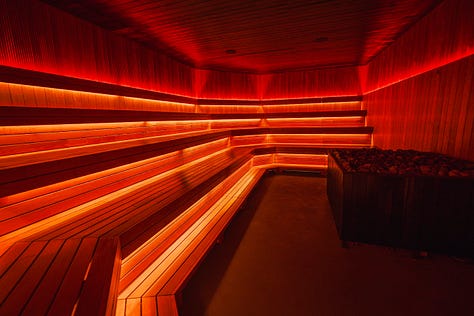
The dream, I think, was to bring all aspects of recovery under one roof: you could recharge in the sauna and check in with a chiropractor in the same place, though you probably wouldn’t do it during the same visit. ARC said its target was “athletes” but also “CEOs and Bay Streeters.” The space was beautiful and reviews were positive.
So what happened?
Gho tells a story about a knee injury that made him realize no one spot could meet all of his recovery needs, but I think the truth is everyone was watching Othership run away with the Toronto wellness market and other people wanted a piece of it. A great founder usually identifies a problem and finds a solution, not the other way around.
Many executives are already members of Adelaide or Cambridge Club, which offer gyms, saunas, cold plunges, chiropractors, physiotherapists, and more.
Even without a clear market need, a well-designed space can find its place even among strong incumbents. If you build it, they’ll come, right? But… how often will they come? And will they pay $55 a class, or $30 more to see your physiotherapist than one at Myodetox 200m away? Not without a better story, and not in Liberty Village.
ARC was left discounting passes to $25 just to get people through the door until the whole thing fell apart. They gave members and pass-holders three days to use their credits — after running a Black Friday sale, which is not cool — but Sweat and Tonic stepped up to honour those credits once they can no longer be used. Smart play.
It takes a lot of guts to dream big and go for it, let alone open a brick-and-mortar business with million-dollar start-up costs. I think there’s a world in which ARC could have been successful if they had asked better questions and repositioned themselves based on the answers. It probably would have ended up as a very different business.
NEWS:
RBC bankers are getting the biggest bonuses this year. The bank has set aside $8.8 billion for incentive pay, which is 16% more than last year. It’s not looking great for your friends at Scotiabank and National.
A healthcare executive was fatally shot in Manhattan. How little sympathy is being shown for the victim of a targeted killing shows you how much Americans hate their healthcare system.
Complex is relaunching its magazine. Bloomberg wrote this great piece about how magazines are soooo back: Field & Stream, Nylon, Saveur, Sports Illustrated and Vice have all committed to restarting their abandoned physical products.
Cohere is building a multi-billion dollar data centre. The federal government agreed to pay for up to $240 million of it, presumably so that the country’s most promising AI start-up doesn’t move to the U.S., which is what the country’s most promising AI chipmaker did last year so that it could raise more money.
Would you pay $30 for one bite of food? People are ordering less (blame Ozempic) but are open to luxurious bites throughout their meals. General Public has a bite of caviar and a sip of champagne on their menu priced at $15.
Air Canada will start using facial recognition software at Pearson. I spoke to a friend who’s a privacy lawyer about this and she rattled off at least seven concerns within seconds, the number one being that biometric data is the most sensitive personal information you have, which opens up all kinds of security concerns. The Toronto Star identified Air Canada’s secret third-party provider as facial recognition company OARO, which uses Amazon software.
Sheertex nabbed a $25 million investment from the Quebec government.
The Unwell team should stop deleting comments. Alex Cooper launched a hydration drink this week and the reception has been mixed: some love it, others have called it “underwhelming”, “unnecessary”, and “just another celebrity drink.” Her team tried very hard over the first few days to control the conversation by deleting negative comments (and pausing comments when they went to bed, which is hilarious) but they became more selective after people started pointing it out. I think it shows you who she thinks her fans are if she thinks a cheap-looking and Nestlé-backed electrolyte drink designed “for women” is going to be a hit.
That’s it from me today. I hope you have a great weekend.


